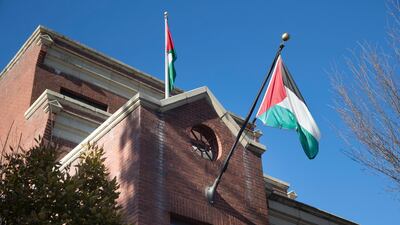The Trump administration has backtracked on its decision to close the PLO office in Washington, instead saying it would merely impose limitations on the office that it expected would be lifted after 90 days.
US officials said last week that the Palestine Liberation Organisation mission could not stay open because the Palestinians had violated a provision in US law that requires the office to close if the Palestinian leadership tries to get the International Criminal Court to prosecute Israelis. The move triggered a major rift in US-Palestinian relations that threatened to scuttle president Donald Trump's ambitious effort to broker peace between the Israelis and Palestinians before it ever got off the ground.
Yet the United States delayed closing the office for a week while saying it was working out the details with the Palestinians — before abruptly reversing course late on Friday. State department spokesman Edgar Vasquez said the United States had "advised the PLO office to limit its activities to those related to achieving a lasting, comprehensive peace between the Israelis and Palestinians".
Mr Vasquez said even those restrictions will be lifted after 90 days if the US determines the Israelis and Palestinians are engaged in serious peace talks. The White House, in an effort led by Mr Trump's adviser and son-in-law Jared Kushner, has been preparing a comprehensive peace plan to present to both sides in the coming months.
_________________
Read more:
US wants PLO's Washington office to stay open, says state department
Palestinians to meet in Cairo to discuss reconciliation
_________________
"We therefore are optimistic that at the end of this 90-day period, the political process may be sufficiently advanced that the president will be in a position to allow the PLO office to resume full operations," Mr Vasquez said.
The reversal marked a serious departure from the administration's interpretation of the law only a week earlier. Officials had said then that, one way or another, the office had to close because Palestinian president Mahmoud Abbas, in a UN speech in September, had called on the ICC to investigate and prosecute Israelis. That same law, though, says that the president can let the office re-open after 90 days despite an ICC push if serious Israeli-Palestinian talks are underway.
Asked how the Trump administration explains its new interpretation of about what must happen if the Palestinians call for an ICC investigation, Mr Vasquez said: "These actions are consistent with the president's authorities to conduct the foreign relations of the United States."
There were no indications that the Trump administration had initially moved to close the office as part of a premeditated strategy to strengthen its hand in eventual peace talks. Instead, officials explained the move by saying US secretary of state Rex Tillerson, in a strict interpretation of the law, determined that Mr Abbas' speech had crossed the legal line.
The chaos that ensued after the announcement, with the US unable for several days to explain if the office was truly closing and when, indicated it had caught much of the government off-guard.
Still, the move led the Palestinians to issue an angry response last weekend threatening to suspend all communication with the US. Additionally, senior Palestinian negotiator Saeb Erekat accused the US of bowing to pressure from Israeli prime minister Benjamin Netanyahu's government "at a time when we are trying to co-operate to achieve the ultimate deal".
Mr Vasquez said the original position had never been intended to create leverage or impose pressure, while the state department said the administration was actively working to pursue lasting Israeli-Palestinian peace.
The requirement about the mission closing stems from a little-noticed provision in American law that says the US cannot allow the Palestinians to have a Washington office if they back the international court's move to investigate or prosecute Israeli nationals for alleged crimes against Palestinians.
Mr Abbas said at the United Nations in September that the Palestinians had "called on the International Criminal Court to open an investigation and to prosecute Israeli officials for their involvement in settlement activities and aggressions against our people".

